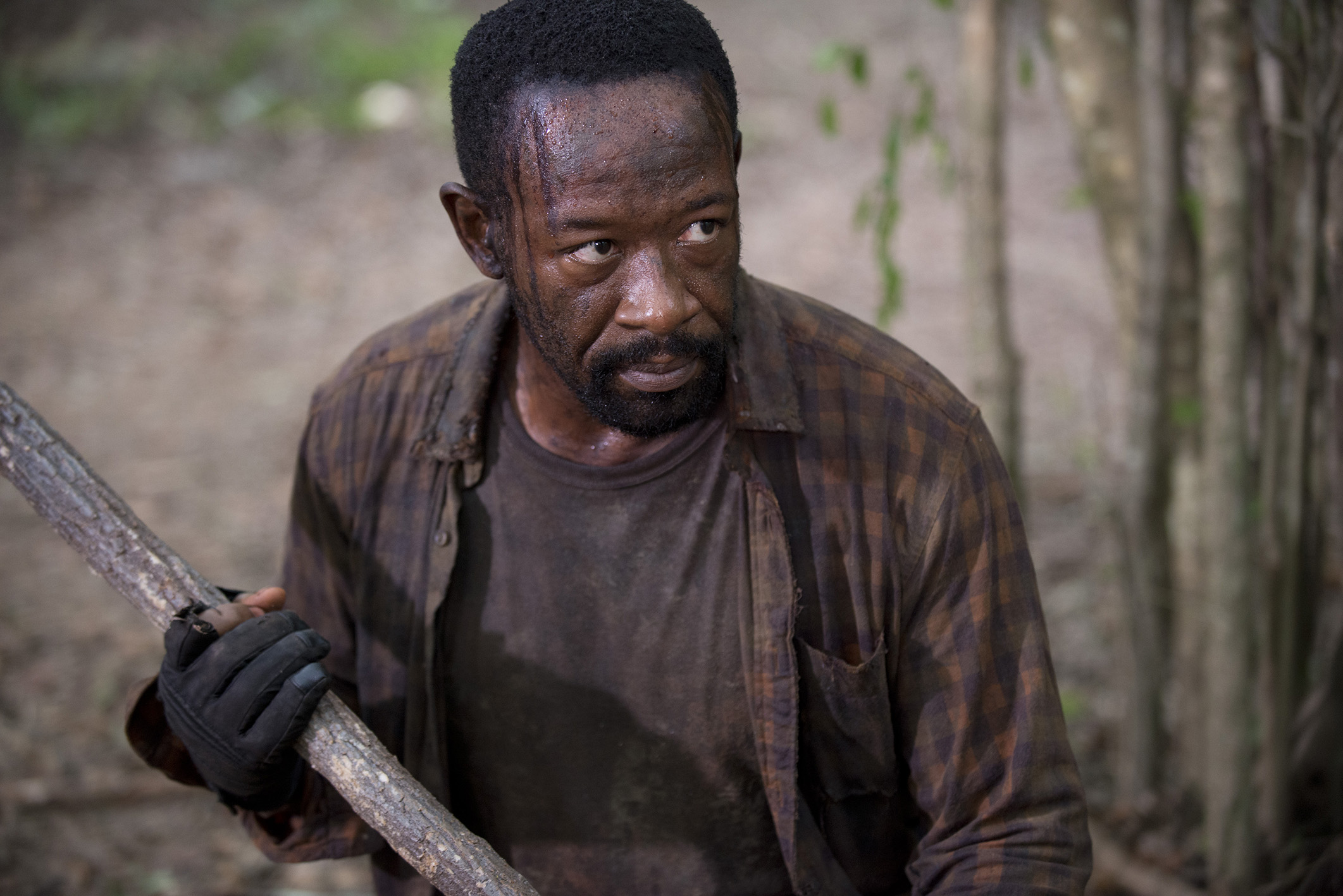Why you can trust GamesRadar+
This is not the episode of The Walking Dead that most people want to be watching right now. Depending on your view on the Schrödinger's Glenn (yes, I know, he's not in a box so that doesn't really work, but I'm running with it OK) situation, you'll either be desperate to see how his death effects the rest of the group, or wondering just how he got out of that big zombie pile on. But instead this is one of show's slowest, most determinedly character-driven episodes yet. It's also – at 65 minutes – one of the longest.
Morgan's story has been fairly sketchily told, up until this point, so it was inevitable that we would eventually get an episode dedicated to filling in some of the blanks between “Clear” (still one of this show's finest instalments) and the present day.
It all hinges on Eastman (John Carroll Lynch), the former criminal psychiatrist with a taste for cheese who finds and takes him in. For the most part, this is a two-hander, with the occasional zombie interruption. It works thanks to stellar performances from Lennie James and a less showy, but equally impressive, Lynch. While James is giving his best snarling psychosis – aided by a naff and wholly unnecessary visual effect – Lynch is quiet and grounded. You half-expect him to turn out to be secretly evil (never trust a man who just happens to have a cell in his house), but the show resists that temptation. He has a dark secret, and a truly awful one at that, but it's used for character purposes, rather than an artificial moment of drama. You like the guy – and the fact that he is clearly going to end up dead – hangs over the episode.

Where the episode really worked was in its filling out of Nu Zen Morgan's philosophy, which is in stark contrast to Rick's. He believes that there is almost always a non-violent solution, where Rick and Carol too easily reach for a gun. The Walking Dead would be awfully dull without the weapons, but it was good to see an episode that offered a more hopeful view of the world. It also shone further light on his frustrating actions in “JSS”, retroactively making them seem like consistent characterisation, rather than Morgan just being a bit of a condescending prick.
That said, "Here's Not Here" hammered its points home with all the subtlety of Doctor Who doing a “what if the Zygons were like ISIS?” episode. That wouldn't necessarily be a problem if it wasn't also so damn long. What could have been a lean 45 minutes dragged its heels at 65. A few of the plot decisions were also more than usually contrived. Eastman's cell door being unlocked the whole time works as an on-the-nose metaphor, but strains credibility. The return of the kid that Morgan killed at the beginning was also a little too convenient, and I'm not a fan of the way that agile, nimble Eastman is clumsily bitten the very second after he runs out of narrative purpose.
The final scene returns us to the present day and a more familiar tone. The Wolf that Morgan captured is threatening dire consequences and our man is clearly tempted to resort to violence. He holds firm. Where “Here's Not Here” succeeds is in establishing Morgan as not just a good man (Tyreese was a good man and look what happened to him), but a man of strength and moral conviction too. If Andrew Lincoln were ever to hand in his sheriff's badge, he'd make a great replacement.
Glenn
So, dead or alive? It seemed pretty final last week, but with the benefit of hindsight it's clear that something is up. The way that scene was shot was so ambiguous. And the fact that “Here's Not Here” doesn't allude to such a momentus event at all is itself suspicious. The timing of the episode feels like a deliberate way of keeping us hanging on. We're gonna call it now – Glenn's fine and hiding under Nicholas's body. Unless, of course, it's all a double-bluff.
| Writer | Scott Gimple |
|---|---|
| Director | Stephen Williams |
| The one where | Morgan tells the story of how he returned to sanity and where he learned those nifty fighting skills |
More info
| Genre | "Action" |
| Description | We're still shocked at how great Telltale's newest series is. The gameplay is tense and great, the story keeps getting better, and the unique visual style continues to blow us away. We're hungry for more. |
| Platform | "PS Vita","PS4","PS3","Xbox 360","PC" |
| US censor rating | "Mature","Mature","Mature","Mature","Mature" |
| UK censor rating | "","","","","" |
| Release date | 1 January 1970 (US), 1 January 1970 (UK) |

Will Salmon is the Comics Editor for GamesRadar/Newsarama. He has been writing about comics, film, TV, and music for more than 15 years, which is quite a long time if you stop and think about it. At Future he has previously launched scary movie magazine Horrorville, relaunched Comic Heroes, and has written for every issue of SFX magazine for over a decade. He sometimes feels very old, like Guy Pearce in Prometheus. His music writing has appeared in The Quietus, MOJO, Electronic Sound, Clash, and loads of other places and he runs the micro-label Modern Aviation, which puts out experimental music on cassette tape.
Ryan Gosling in Star Wars? The Barbie star is reportedly in talks to join Deadpool & Wolverine director Shawn Levy's movie

33 years after his cartoon was canceled, Captain Planet is back (and kinda hot) in a new comic book
Bloodborne still seems a long way from getting an official 60fps port, but fans have finally gotten PS4 emulators to deliver the remaster they’ve wanted for years
Most Popular



